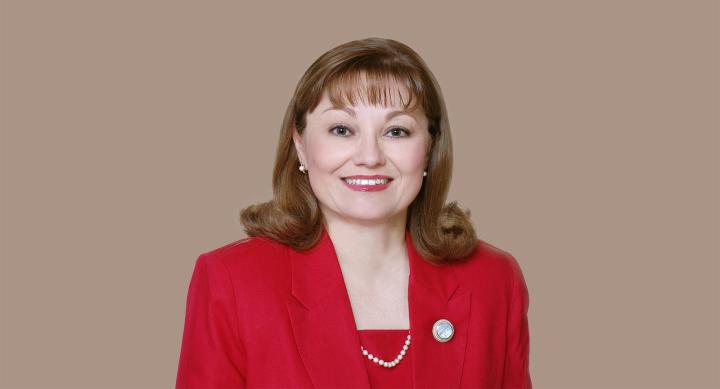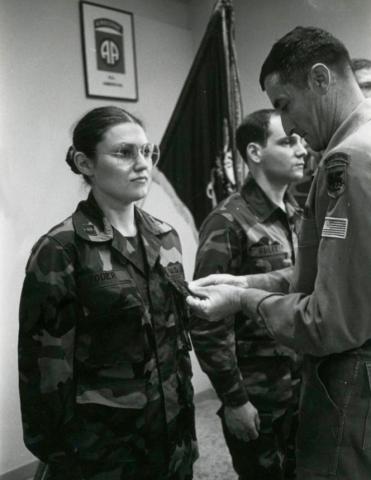
My biggest accomplishment is the students that I have helped and have graduated with their graduate degrees. I maintained high standards and expectations from my students, but I knew they could meet my expectations and they did, even when they didn’t believe they could.” - Linda Yoder
Many people at the School of Nursing knew Linda H. Yoder, PhD, MBA, RN, AOCN, FAAN as a professor, Luci Baines Johnson Fellow in Nursing and researcher before retiring in 2024 as professor emerita.
But she’s also been known as Colonel Yoder—a rank she earned after a 28-year career in the U.S. Army Nurse Corps (ANC) before retiring in September 2002. Her military career included positions at Walter Reed Medical Center, Fort Sam Houston and stints in South Korea and Italy.
After her military service, Yoder sought an opportunity to teach the next generation of nurses when then-Dean Dolores Sands asked her to interview for a faculty position.
Yoder served at the School of Nursing for 17 years in a variety of positions while teaching, including director of the Nursing Administration Concentration. Before the program ended, it was highly ranked by the U.S. News & World Report.
At the time, it was the only program ranked in the School of Nursing, Yoder said. She also taught graduate health care systems management courses, as well as advised and coached Master’s and Doctoral students.
Honors for exceptional teaching
In 2014, former School of Nursing professor Terry Jones, PhD, RN, asked Yoder if she would do a quick faculty presentation. After agreeing, she was told not to prepare a slideshow and that the presentation would be a brief overview with time for questions and answers. Several faculty members, as well as then-Dean Alexa Stuifbergen, PhD, RN, FAAN, attended, and Yoder learned it was being filmed for those who couldn’t attend.
Yoder was surprised to learn later that the filming was for the Academy of Medical-Surgical Nurses (AMSN). Jones informed her she was being awarded the President’s Award from the AMSN. Yoder was unable to attend the convention, so the video was sent to the AMSN to show during the event.
“It’s hard to surprise me, but that was a complete surprise,” Yoder said. “I was very honored and humbled to receive that award.”
She has also earned dozens of honors for oncology nursing, medical-surgical nursing and nursing excellence, among others. Yoder received the UT Austin Billye J. Brown Award for Excellence in Leadership and the Epsilon Theta Chapter, Sigma Theta Tau Dolores Sands Outstanding Researcher Award.
Yoder is an alumna of the Robert Wood Johnson Executive Nursing Fellowship and a past president of the Academy of Medical-Surgical Nurses. She is a member of several professional nursing organizations, including the Academy of Medical-Surgical Nurses, the Oncology Nursing Society, the Association of Nurse Executives, the American Nurses Association and Sigma Theta Tau International.
Continuing to serve

Yoder described her experience at the School of Nursing as invaluable and one she will never forget.
“After my career in the Army, I believe working at the School of Nursing allowed me to continue to serve the nation and the state of Texas,” she said.
Yoder was an officer in the ANC for 28 years, retiring at the rank of Colonel. Born in Germany and raised in a military family, Yoder was a first-generation student and was the first to graduate from high school and go to college with a scholarship from the Army.
“I will forever be indebted to the Army for supporting my education from BSN to PhD,” she added. “The Army also developed me as a leader and teacher.”
During her time in the Corps, Yoder led innovative research efforts in oncology, as well as initiatives aimed at improving patient care outcomes. Recognized for her contributions to nursing research, she received the Phyllis J. Verhonick Award in 1990 and 1992. This honor is presented to an Army nurse who demonstrates excellence in research that significantly contributes to nursing and improves patient care outcomes.
As a researcher, Yoder spent most of her career working and conducting research in hospitals. Her areas of research have included examining patient care problems, the nursing work environment, career development relationships of nurses and quality of life in patients with chronic illnesses, such as cancer, cardiovascular and pulmonary disease, as well as burn survivors.
To this day, Yoder continues to collaborate with active-duty military researchers, serving as a research mentor to new investigators. She also collaborates with the hospital systems in the Austin region. Even as she transitions to a new phase, Yoder plans to remain involved in academia, continuing her own scholarship and contributing to the UT Austin community.
“Scholarship does not end at retirement,” Yoder said.
Dedicated to research
While at the School of Nursing, Yoder completed a variety of projects, including research dealing with longitudinal quality of life outcomes of burn patients treated at the military burn center in San Antonio, qualitative research about Intensive Care Unit nurses’ experiences during COVID-19, and secondary analysis of military nurses’ post-deployment posttraumatic growth experiences.
Yoder has also completed a national study of medical-surgical nurses’ experiences of posttraumatic growth after the pandemic, as well as studies examining medical-surgical nurses’ evidence-based practice competencies.
Beyond her professional accomplishments, Yoder’s impact extended to becoming a dedicated educator and mentoring students at the School of Nursing. Yoder mostly taught graduate students—MSN, DNP and PhD.
While at the School of Nursing, military PhD students came to the School to specifically work with her. She says she’s worked with about six Army nurse MSN and PhD students, as well as 17 civilian PhD and DNP students, who have all done exceptionally well in the program. She will continue to work with several PhD students at the School of Nursing until they graduate.
Leading through teaching
Reflecting on her legacy as an educator, Yoder emphasized the impact she’s had on not only military but also civilian students. She takes pride in the leadership roles her military PhD students have assumed within the ANC, as well as instilling a sense of scholarly excellence and leadership in her civilian students. Despite facing pushback from some MSN and DNP students due to her high standards, Yoder remained committed to upholding rigorous academic expectations.
“I’m never going to make an excuse for myself in terms of having high standards,” she added. “I will own up to that. And I think they find out later, some of the students because sometimes they email me or they’ll send me a note, they realize later that, that was the right thing even though they didn’t appreciate it at the time.”
She stresses the importance of fostering leadership at all levels in nursing and advocating for lifelong learning, both for herself and her students.
“My biggest accomplishment is the students that I have helped and have graduated with their graduate degrees,” she said. “I maintained high standards and expectations from my students, but I knew they could meet my expectations and they did, even when they didn’t believe they could.”
Yoder said she hopes the students she’s taught over the years remember her for the ways she cared for them as people and as nurses.
“I wanted to help develop them into the best versions of themselves as nurses,” she added.
She shared that her favorite aspect about teaching nursing students is that nurses care about people, and they want to serve their communities. She considers nurses to be the linchpin that holds the health care system together.
“Nursing is hard work regardless of the setting,” she added. “You must be passionate about nursing as a career and providing the best possible outcomes for patients, families and students. Expect the best of yourself and your peers.”